#Roxana Hadadi
Explore tagged Tumblr posts
Text
Alys Rivers is an intriguing character who presents more questions than answers.
An interview with Gayle Rankin (Alys Rivers) by Roxana Hadadi.
[F]or now, she plays Alys like she owns the place with a hard edge and a chin-up defiance inspired by Rankin’s own Scottish and Celtic heritage as well as pagan goddesses, the Greek priestess Cassandra, and Joan of Arc. The fact that Fire & Blood’s narrators and cited sources are mostly men trying to wrap their heads around Alys gave the actress room to play with the character’s dance among fact, faction, and infamy. “I’m really interested in playing with the idea of perception, in women who were identified as being witches and around whom there was a lot of controversy and confusion and questions,” Rankin says. “Even plays like The Crucible — those were quote-unquote normal women who were identified as being witches.” [ ... ] What kind of stuff do you think Alys got up to in Harrenhal before Daemon showed up? I do believe she’s a maester of sorts, and a healer in many senses of the word. Whether or not Alys’s potions are actually potions, she’s kept Harrenhal on its feet for generations, in terms of just like, keeping people alive — or not.
She apparently shoots down a fan theory.
There is a fan theory that Alys and the Red Priestess Melisandre from Game of Thrones are the same characters. Do you have a reaction to that? I would say that there are no other characters that have been repeated in the House of the Dragon world, so I’m not sure why we would start now.
If we see Melisandre at all in HOTD I have a feeling that it would be in Essos. Perhaps a short scene of her running into Laenor Velaryon who would spark her eventual interest in Westeros?
Read the entire article at Vulture.

#game of thrones#house of the dragon#alys rivers#gayle rankin#roxana hadadi#harrenhal#melisandre#ród smoka#la maison du dragon#дім дракона#龙之家族#juego de tronos#a guerra dos tronos#a casa do dragão#la casa del dragón#آل التنين#ड्रैगन का घर#ejderha evi#בית הדרקון#gia tộc rồng#casă dragonului#σπίτι του δράκου#하우스 오브 드래곤#haus des drachen#ڈریگن ہاؤس#lohede koda#isang kanta ng yelo at apoy#lohikäärmeen talo#হাউস অফ দ্য ড্রাগন#дом дракона
8 notes
·
View notes
Text
3 notes
·
View notes
Text
#roxana hadadi#islam#dune#frank herbert#science fiction#science fiction literature#denis villeneuve#orientalism
5 notes
·
View notes
Text
youtube
Here is a video podcast of a conversation between Roxana Hadadi, TV Critic at Vulture & myself about the series I'm A Virgo.
#tv#tv review#podcast#video podcast#i'm a virgo#amazon prime video#prime video#TV Critic#Roxana Hadadi#Julian Lytle#Ignorant Bliss Podcast#boots riley#Tze Chun#jharrel jerome#mike epps#carmen ejogo#black tv shows#Black Surrealism#surealism#Superpowers#Youtube
0 notes
Text
“Sam Reid’s regular line deliveries are basically the equivalent of a Baroque painting of a hot man glaring at you (think Caravaggio’s David With the Head of Goliath painting, but sexy), so I’m unsurprised that his singing voice is the exact same thing. Big fan of how his ‘ooh ooh ooh, wah aah’ sounds like Jim Morrison doing a Dracula impression. It’s a bop. I’m so sorry to Stuart Townsend for getting replaced as Aragorn in the Lord of the Rings trilogy and now having his rock star Lestat from Queen of the Damned shown up so thoroughly.” —Roxana Hadadi
Oh yeah folks! Hopefully we have YEARS of this still to come!
#interview with the vampire#anne rice#amc interview with the vampire#lestat de lioncourt#the vampire lestat#amc iwtv#iwtv amc#iwtv lestat#rockstar lestat#sam reid lestat#sam reid#samstat
64 notes
·
View notes
Text
saw Dune 2 today and it's been a while since I read the books but things felt off enough for me to check around. found this article by Roxana Hadadi about some of the differences and why they matter. enjoyed the movie overall but they make some great points
13 notes
·
View notes
Text
267 - Heat (with Roxana Hadadi!) (Patreon Selects)
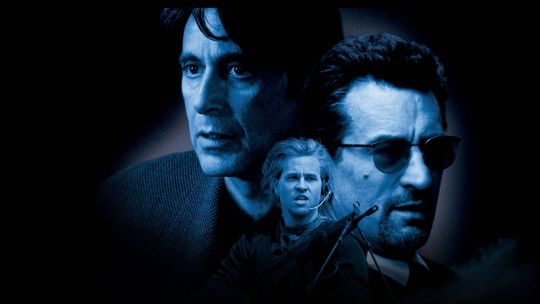
This week, our first film selected by one of our sponsor-tier Patreon subscribers arrives, and we brought back Vulture's Roxana Hadadi to celebrate. In 1995, audiences were hyped to finally see an onscreen showdown between Al Pacino and Robert DeNiro in Michael Mann's Heat. But what promised to be a standard actioner on paper (on top of a battle of titans) was in actuality an existential tone poem on masculinity, with audiences feeling let down by the lack of fireworks in Pacino and DeNiro's brief but mighty scene. The film has since been reassessed, earning a vocal and devoted fanbase that hail the film as Mann's masterpiece.
This week, we talk about Mann's work studying the masculine mind and Pacino and DeNiro's 1990s periods. We also talk about Val Kilmer's Batman year, how the 1995 Oscars largely rejected darker material, and our thoughts on Mann's Ferrari.
Topics also include bisexual eyebrow piercings, our diner orders, and the Nyad towel.
Links:
The 1995 Academy Awards
Roxana on Jacob Elordi's Saltburn Eyebrow Piercing
Vulture Movies Fantasy League
Subscribe:
Patreon
Spotify
Apple Podcasts
Google Play
#Michael Mann#Heat#Al Pacino#Robert DeNiro#Val Kilmer#Ashley Judd#Natalie Portman#Jon Voight#Tom Sizemore#Amy Brenneman#Diane Venora#Mykelti Williamson#Wes Studi#Dennis Haysbert#Ted Levine#Tom Noon#William Fichtner#Danny Trejo#Hank Azaria#Tone Loc#Henry Rollins#Bud Cort#Best Actor#Best Director#Academy Awards#Oscars#movies#MTV Movie Awards#Tom Noonan
11 notes
·
View notes
Text
The Middle Geeks Episode 63: 'Dune: Part Two' Review
The Middle Geeks are joined once again by Roxana Hadadi to review the latest in the "Dune" franchise, "Dune: Part Two."
The second installment in Denis Villeneuve’s adaptation of Dune has arrived to theaters, but has it gotten any better in its display of SWANA cultures beyond appropriation? Roxana joins us once again to discuss. Continue reading The Middle Geeks Episode 63: ‘Dune: Part Two’ Review

View On WordPress
#Amazigh#Arab#Arabic#Black Adam#DCTV#Denis Villeneuve#Dune#Farsi#Frank Herbert#Hard NOC Media#Islam#Javier Bardem#Mae Adbulbaki#MENA#Middle East#Muslim#Muslims#North Africa#North African#Orientalism#Persian#Podcasts#Roxana Hadadi#Souheila Yacoub#SWANA#Swara Salih#The Middle Geeks#Timothée Chalamet#Warner Bros.#Zendaya
4 notes
·
View notes
Text
'...Jen Chaney’s Top 10 Shows
...2. Ripley
Most remakes are rehashes or retellings that change certain details but ultimately leave their audience with the same thoughts and feelings they had the first time they heard this story. The Patricia Highsmith novel The Talented Mr. Ripley has been adapted numerous times, most notably as a 1999 Anthony Minghella film, but Ripley is not a remake; it’s more of a reframing. Shot in rich black and white by director and writer Steven Zaillian alongside Oscar-winning cinematographer Robert Elswit, Ripley’s eight episodes take their exquisite time, both with character development and, crucially, the moments Tom Ripley (Andrew Scott) commits his crimes and goes through the grueling work of attempting to cover them up. In this Ripley, you see and feel the weight of what he’s done — the labor that comes with hiding a body, the blood that has to be scrubbed away — much more intensely, which makes his lack of concern and ability to blithely lie all the more shocking. Scott delivers a phenomenally restrained performance; the look in his eyes is constantly blank, as if he’s inviting others to fill in the emotions and authenticity he’s incapable of producing himself. Much like the cat that lurks in the lobby of Ripley’s apartment building in Rome, you can’t stop staring at this fraud of a man and wondering how long he can go until someone finally figures him out...
Roxana Hadadi’s Top 10 Shows
...2. Ripley
No television show this year looked this good or felt this ugly. With a magnetically dreary allure, Steven Zaillian’s Ripley embraced paranoia, meanness, and bad vibes, chasing all memories of Anthony Minghella’s sun-soaked 1999 film away. With chilly black-and-white cinematography and sparse dialogue, Zaillian magnified the vein of cruelty running through Patricia Highsmith’s The Talented Mr. Ripley, while Andrew Scott used every muscle in his body to render his scamming, murderous Ripley unreadable, the living embodiment of want and coveting clever enough to never let anyone catch on to the depths of his desire. (Except for Dakota Fanning’s Marge, giving a skeptical performance here just as delicious as her work in The Perfect Couple.) Tom dragging his latest victim’s body down the stairs of his beautiful Italian apartment building, then getting increasingly irritated at having to clean up all the blood he has tracked around, all while getting judgmental glares from Lucio the cat? Most grimly hilarious sequence of the year...
Kathryn VanArendonk’s Top 10 Shows
...7. Ripley
Yes, it has an impeccable lead performance from Andrew Scott, and, yes, it has a perfect TV cat, and, yes, Dakota Fanning pulls off a tricky role, and, yes, it has one of the most gruesome boat-based murder sequences filmed in a long while, and, yes, its pretensions may occasionally get the better of it. But beyond all that, was there a more visually astounding series on TV this year? No, and it’s not a close contest. At first glance, Ripley’s black-and-white cinematography might look like a bug rather than a feature, a snooty approach to Patricia Highsmith’s con-man story. But the look of Ripley is not a superficial layer — it’s the foundation that makes the entire thing work, a visual version of the same language of class-based posturing and brutal striving that drives its whole worldview. All that Italian art drained of color, reduced to light and shadows, so much starker, sharper, and crueler than if it were seen in warm, human tones … that’s the good stuff...'
#Ripley#Andrew Scott#Patricia Highsmith#The Talented Mr Ripley#Steven Zaillian#Anthony Minghella#Robert Elswit#Dakota Fanning
0 notes
Text
The B-Side – Orlando Bloom (with Roxana Hadadi)
http://dlvr.it/SrqxGb
0 notes
Link

[...]

[...]

[...]

52 notes
·
View notes
Link
New story on NPR: Iranian filmmaker Jafar Panahi has been banned from making movies or leaving Iran https://ift.tt/Kfc6Lkp
2 notes
·
View notes
Text
‘America’s Not a Country, It’s Just a Business’: On Andrew Dominik’s ‘Killing Them Softly’ By Roxana Hadadi
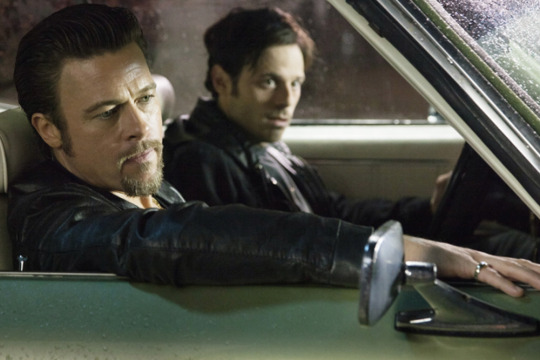
“Shitsville.” That’s the name Killing Them Softly director Andrew Dominik gave to the film’s nameless town, in which low-level criminals, ambitious mid-tier gangsters, nihilistic assassins, and the mob’s professional managerial class engage in warfare of the most savage kind. Onscreen, other states are mentioned (New York, Maryland, Florida), and the film itself was filmed in post-Hurricane Katrina New Orleans, though some of the characters speak with Boston accents that are pulled from the source material, George V. Higgins’s novel Cogan’s Trade. But Dominik, by shifting Higgins’s narrative 30 or so years into the future and situating it specifically during the 2008 Presidential election, refuses to limit this story to one place. His frustrations with America as an institution that works for some and not all are broad and borderless, and so Shitsville serves as a stand-in for all the places not pretty enough for gentrifying developers to turn into income-generating properties, for all the cities whose industrial booms are decades in the past, and for all the communities forgotten by the idea of progress._ Killing Them Softly_ is a movie about the American dream as an unbeatable addiction, the kind of thing that invigorates and poisons you both, and that story isn’t just about one place. That’s everywhere in America, and nearly a decade after the release of Dominik’s film, that bitter bleakness still has grim resonance.
In November 2012, though, when Killing Them Softly was originally released, Dominik’s gangster picture-cum-pointed criticism of then-President Barack Obama’s vision of an America united in the same neoliberal goals received reviews that were decidedly mixed, tipping toward negative. (Audiences, meanwhile, stayed away, with Killing Them Softly opening at No. 7 with $7 million, one of the worst box office weekends of Brad Pitt’s entire career at that time.) Obama’s first term had been won on a tide of hope, optimism, and “better angels of our nature” solidarity, and he had just defeated Mitt Romney for another four years in the White House when Killing Them Softly hit theaters on Nov. 30. Cogan’s Trade had no political components, and no connections between the thieving and killing promulgated by these criminals and the country at large. Killing Them Softly, meanwhile, took every opportunity it could to chip away at the idea that a better life awaits us all if we just buy into the idea of American exceptionalism and pull-yourself-up-by-your-bootstraps ingenuity. A fair amount of reviews didn’t hold back their loathing toward this approach. A.O. Scott with the New York Times dismissed Dominik’s frame as “a clumsy device, a feint toward significance that nothing else in the movie earns … the movie is more concerned with conjuring an aura of meaningfulness than with actually meaning anything.” Many critics lambasted Dominik’s nihilism: For Deadspin, Will Leitch called it a “crutch, and an awfully flimsy one,” while Richard Roeper thought the film collapsed under the “crushing weight” of Dominik’s philosophy. It was the beginning of Obama’s second term, and people still thought things might get better.
But Dominik’s film—like another that came out a few years earlier, Adam McKay’s 2010 political comedy The Other Guys—has maintained a crystalline kind of ideological purity, and perhaps gained a certain prescience. Its idea that America is less a bastion of betterment than a collection of corporate interests, and the simmering anger Brad Pitt’s Jackie Cogan captures in the film’s final moments, are increasingly difficult to brush off given the past decade or so in American life. This is not to say that Obama’s second term was a failure, but that it was defined over and over again by the limitations of top-down reform. Ceaseless Republican obstruction, widespread economic instability, and unapologetic police brutality marred the encouraging tenor of Obama’s presidency. Donald Trump’s subsequent four years in office were spent stacking the federal judiciary with young, conservative judges sympathetic toward his pro-big-business, fuck-the-little-guy approach, and his primary legislative triumph was a tax bill that will steadily hurt working-class people year after year.
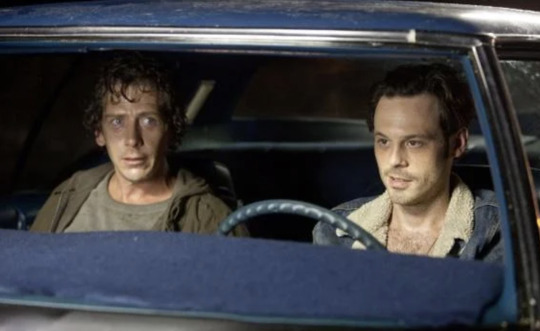
The election of Obama’s vice president Joe Biden, and the Democratic Party securing control of the U.S. Senate, were enough for a brief sigh of relief in November 2020. The $1.9 trillion stimulus bill passed in March 2021 does a lot of good in extending (albeit lessened) unemployment benefits, providing a child credit to qualifying families, and funneling further COVID-19 support to school districts after a year of the coronavirus pandemic. But Republicans? They all voted no to helping the Americans they represent. Stimulus checks to the middle-class voters who voted Biden into office? Decreased for some, totally cut off for others, because of Biden’s appeasement to the centrists in his party. $15 minimum wage? Struck down, by both Republicans and Democrats. In how many more ways can those politicians who are meant to serve us indicate that they have little interest in doing anything of the kind?
Modern American politics, then, can be seen as quite a performative endeavor, and an exercise in passing blame. Who caused the economic collapse of 2008? Some bad actors, who the government bailed out. Who suffered the most as a result? Everyday Americans, many of whom have never recovered. Killing Them Softly mimics this dynamic, and emphasizes the gulf between the oppressors and the oppressed. The nameless elites of the mob, sending a middle manager to oversee their dirty work. The poker-game organizer, who must be brutally punished for a mistake made years before. The felons let down by the criminal justice system, who turn again to crime for a lack of other options. The hitman who brushes off all questions of morality, and whose primary concern is getting adequately paid for his work. Money, money, money. “This country is fucked, I’m telling ya. There’s a plague coming,” Jackie Cogan says to the Driver who delivers the mob’s by-committee rulings as to who Jackie should intimidate, threaten, and kill so their coffers can start getting filled again. Perhaps the plague is already here.
“Total fucking economic collapse.”
In terms of pure gumption, you have to applaud Dominik for taking aim at some of the biggest myths America likes to tell about itself. After analyzing the dueling natures of fame and infamy through the lens of American outlaw mystique in The Assassination of Jesse James by the Coward Robert Ford, Dominik thought bigger, taking on the entire American dream itself in Killing Them Softly. From the film’s very first second, Dominik doesn’t hold back, equating an easy path of forward progress with literal trash. Discordant tones and the film’s stark, white-on-black title cards interrupt Presidential hopeful Barack Obama’s speech about “the American promise,” slicing apart Obama’s words and his crowd’s responding cheers as felon Frankie (Scoot McNairy), in the all-American outfit of a denim jacket and jeans, cuts through what looks like a shut-down factory, debris and garbage blowing around him. Obama’s assurances sound very encouraging indeed: “Each of us has the freedom to make of our own lives what we will.” But when Frankie—surrounded by trash, cigarette dangling from his mouth, and eyes squinting shut against the wind—walks under dueling billboards of Obama, with the word “CHANGE” in all-caps, and Republican opponent John McCain, paired with the phrase “KEEPING AMERICA STRONG,” a better future doesn’t exactly seem possible. Frankie looks too downtrodden, too weary of all the emptiness around him, for that.
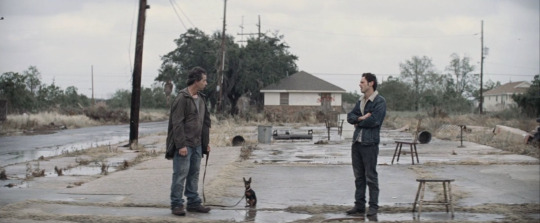
Dominik and cinematographer Greig Fraser spoke to American Cinematographer magazine in October 2012 about shooting in post-Hurricane Katrina New Orleans: “We were aiming for something generic, a little town between New Orleans, Boston and D.C. that we called Shitsville. We wanted the place to look like it’s on the down-and-down, on the way out. We wanted viewers to feel just how smelly and grimy and horrible it was, but at the same time, we didn’t want to alienate them visually.” They were successful: Every location has a rundown quality, from the empty lot in which Frankie waits for friend and partner-in-crime Russell (Ben Mendelsohn)—a concrete expanse decorated with a couple of wooden chairs, as if people with nowhere else to go use this as a gathering spot—to the dingy laundromat backroom where Frankie and Russell meet with criminal mastermind Johnny “Squirrel” Amato (Vincent Curatola), who enlists them to rob a mafia game night run by Markie Trattman (Ray Liotta), to the restaurant kitchen where the game is run, all sickly fluorescent lights, cracked tile, and makeshift tables. Holding up a game like this, from which the cash left on the tables flows upward into the mob’s pockets, is dangerous indeed. But years before, Markie himself engineered a robbery of the game, and although that transgression was forgiven because of how well-liked Markie is in this institution, it would be easy to lay the blame on him again. And that’s exactly what Squirrel, Frankie, and Russell plan to do.
The “Why?” for such a risk isn’t that hard to figure out. Squirrel sees an opportunity to make off with other people’s money, he knows that any accusatory fingers will point elsewhere first, and he wants to act on it before some other aspiring baddie does. (Ahem, sound like the 2008 mortgage crisis to you?) Frankie, tired of the crappy jobs his probation officer keeps suggesting—jobs that require both long hours and a long commute, when Frankie can’t even afford a car (“Why the fuck do they think I need a job in the first place? Fucking assholes”)—is drawn in by desperation borne from a lack of options. If he doesn’t come into some kind of money soon, “I’m gonna have to go back and knock on the gate and say, ‘Let me back in, I can’t think of nothing and it’s starting to get cold,’” Frankie admits. And Australian immigrant and heroin addict Russell is nursing his own version of the American dream: He’s going to steal a bunch of purebred dogs, drive them down to Florida to sell for thousands of dollars, buy an ounce of heroin once he has $7,000 in hand, and then step on the heroin enough to become a dealer. It’s only a few moves from where he is to where he wants to be, he figures, and this card-game heist can help him get there.
In softly lit rooms, where the men in the frame are in focus and their surroundings and backgrounds are slightly blown out, slightly blurred, or slightly fuzzy (“Creaminess is something you feel you can enter into, like a bath; you want to be absorbed and encompassed by it” Fraser told American Cinematographer of his approach), garish deals are made, and then somehow pulled off with a sobering combination of ineptitude and ugliness. Russell buys yellow dishwashing gloves for himself and Frankie to wear during the holdup, and they look absurd—but the pistol-whipping Russell doles out to Markie still hurts like hell, no matter what accessories he’s wearing. Dominik gives this holdup the paranoia and claustrophobia it requires, revolving his camera around the barely-holding-it-together Frankie and cutting every so often to the enraged players, their eyes glancing up to look at Frankie’s face, their hands twitching toward their guns. But in the end, nobody moves. When Frankie and Russell add insult to injury by picking the players’ pockets (“It’s only money,” they say, as if this entire ordeal isn’t exclusively about wanting other people’s money), nobody fights back. Nobody dies. Frankie and Russell make off with thousands of dollars in two suitcases, while Markie is left bamboozled—and afraid—by what just happened. And the players? They’ll get their revenge eventually. You can count on that.
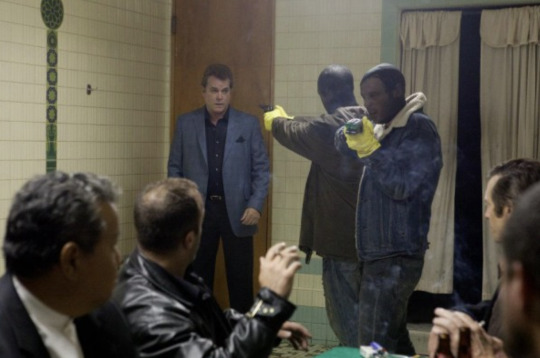
So it goes that Dominik smash cuts us from the elated and triumphant Russell and Frankie driving away from the heist in their stolen 1971 Buick Riviera, its headlights interrupting the inky-black night, to the inside of Jackie Cogan’s 1967 Oldsmobile Toronado, with Johnny Cash’s “The Man Comes Around” providing an evocative accompaniment. “There’s a man going around taking names/And he decides who to free, and who to blame/Everybody won’t be treated all the same,” Cash sings in that unmistakably gravelly voice, and that’s exactly what Jackie does. Called in by the mob to capture who robbed the game so that gambling can begin again, Jackie meets with an unnamed character, referred to only as the Driver (Richard Jenkins), who serves as the mob’s representative in these sorts of matters. Unlike the other criminals in this film—Frankie, with his tousled hair and sheepish face; Russell, with his constant sweatiness and dog-funk smell; Jackie, in his tailored three-piece suits and slicked-back hair; Markie, with those uncannily blue eyes and his matching slate sportscoat—the Driver looks like a square.
He is, like the men who replace Mike Milligan in the second season of Fargo, a kind of accountant, a man with an office and a secretary. “The past can no more become the future than the future can become the past,” Milligan had said, and for all the backward-looking details of Killing Them Softly—American cars from the 1960s and 1970s, that whole masculine code-of-honor thing that Frankie and Russell break by ripping off Markie’s game, the post-industrial economic slump that brings to mind the American recession of 1973 to 1975—the Driver is very much an arm of a new kind of organized crime. He keeps his hands clean, and he delivers what the ruling-by-committee organized criminals decide, and he’s fussy about Jackie smoking cigarettes in his car, and he’s so bland as to be utterly forgettable. And he has the power, as authorized by his higher-ups, to approve Jackie putting pressure on Markie for more information about the robbery. It doesn’t matter that neither Jackie nor the mob thinks Markie actually did it. What matters more is that “People are losing money. They don’t like to lose money,” and so Jackie can do whatever he needs. Dominik gives him this primacy through a beautiful shot of Jackie’s reflection in the car window, his aviators a glinting interruption to the gray concrete overpass under which the Driver’s car is parked, to the smoke billowing out from faraway stacks, and to the overall gloominess of the day.
“We regret having to take these actions. Today’s actions are not what we ever wanted to do, but today’s actions are what we must do to restore confidence to our financial system,” we hear Treasury Secretary Henry Paulson say on the radio in the Driver’s car, and his October 14, 2008, remarks are about the Emergency Economic Stabilization Act of 2008—the government bailout of banks and other financial institutions that cost taxpayers $700 billion. (Remember Will Ferrell’s deadpan delivery in The Other Guys of “From everything I’ve heard, you guys [at the Securities and Exchange Commission] are the best at these types of investigations. Outside of Enron and AIG, and Bernie Madoff, WorldCom, Bear Stearns, Lehman Brothers ...”) Yet the appeasing sentiment of Paulson’s words applies to Jackie, too, and to the beating he orders for Markie—a man he suspects did nothing wrong, at least not this time. But debts must be settled. Heads must roll. “Whoever is unjust, let him be unjust still/Whoever is righteous, let him be righteous still/Whoever is filthy, let him be filthy still,” Cash sang, and Jackie is all those men, and he’ll collect the stolen golden crowns as best he can. For a price, of course. Always for a price.
“I like to kill them softly, from a distance, not close enough for feelings. Don’t like feelings. Don’t want to think about them.”
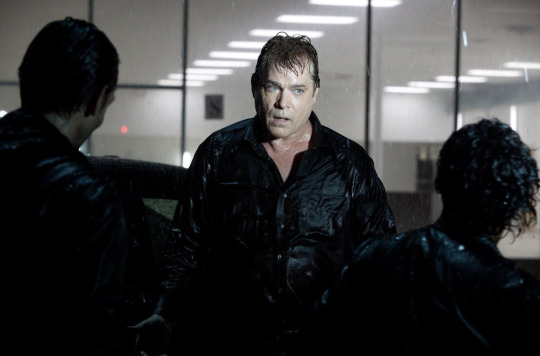
In “Bad Dreams,” the penultimate episode of the second season of The Wire, International Brotherhood of Stevedores union representative Frank Sobotka (Chris Bauer), having seen his brothers in arms made immaterial by the lack of work at the Baltimore ports and the collapse of their industry, learns that his years of bribing politicians to vote for expanded funding for the longshoremen isn’t going to pay off. He is furious, and he is exhausted. “We used to make shit in this country, build shit. Now we just put our hand in the next guy’s pocket,” he says with the fatigue of a man who knows his time has run out, and you can draw a direct line from Bauer’s beleaguered delivery of those lines to Liotta’s aghast reaction to the horrendous beating he receives from Jackie’s henchmen. Sobotka in The Wire had no idea how he got to that helpless place, and neither does Markie in Killing Them Softly—he made a mistake, but that was years ago. Everyone forgave him. Didn’t they?
The vicious assault leveled upon Markie is a harrowing, horrifying sequence that is also unnervingly beautiful, and made all the more awful as a result of that visual splendor. In the pouring rain, Markie is held captive by the two men, who deliver bruising body shots, break his noise, batter his body against the car, and kick in his ribs. “You see fight scenes a lot in movies, but you don’t see people systematically beating somebody else. The idea was just to make it really, really, really ugly,” Dominik told the New York Times in November 2012, and sound mixer Leslie Shatz and cinematographer Fraser also contributed to this unforgettable scene. Shatz used the sound of a squeegee across a windshield to accentuate Markie’s increasingly destroyed body slumping against the car, and also incorporated flash bulbs going off as punches were thrown, adding a kind of lingering effect to the scene’s soundscape. And although the scene looks like it’s shot in slow motion, Fraser explained to American Cinematographer that the combination of an overhead softbox and dozens of background lights helped build that layered effect in which Liotta is fully illuminated while the dark night around him remains impenetrable. Every drop of rain and every splatter of blood stands out on Markie’s face as he confesses ignorance regarding the robbery and begs for mercy from Jackie’s men, but Markie has already been marked for death. When the time comes, Jackie will shoot him in the head in another exquisitely detailed, shot-in-ultrahigh-speed scene that bounces back and forth between the initial act of violence and its ensuing destruction. The cartridges flying out of Jackie’s gun, and the bullets destroying Markie’s window, and then his brain. Markie’s car, now no longer in his control, rolling forward into an intersection where it’s hit not just once, but twice, by oncoming cars. The crunching sound of Markie’s head against his windshield, and the vision of that glass splintering from the impact of his flung body, are impossible to shake.
“Cause and effect,” Dominik seems to be telling us, and Killing Them Softly follows Jackie as he cleans up the mess Squirrel, Frankie, and Russell have made. After he enlists another hitman, Mickey (a fantastically whoozy James Gandolfini, who carries his bulk like the armor of a samurai searching for a new master), whose constant boozing, whoring, and laziness shock Jackie after years of successful work together, and who refuses to do the killing for which Jackie secured him a $15,000 payday, Jackie realizes he’ll need to do this all himself. He’ll need to gather the intel that fingers Frankie, Russell, and Squirrel. He’ll need to set up a police sting to entrap Russell on his purchased ounce of heroin, violating the terms of his probation, and he’ll need to set up another police sting to entrap Mickey for getting in a fight with a prostitute, violating the terms of his probation. For Jackie, a career criminal for whom ethical questions have long since evaporated, Russell’s and Frankie’s sloppiness in terms of bragging about their score is a source of disgust. “I guess these guys, they just want to go to jail. They probably feel at home there,” he muses, and he’s then exasperated by the Driver’s trepidation regarding the brutality of his methods. Did the Driver’s bosses want the job done or not? “We aim to please,” Jackie smirks, and that shark smile is the sign of a predator getting ready to feast.
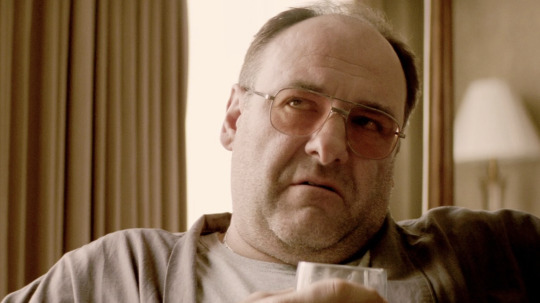
Things progress rapidly then: Jackie tracks Frankie down to the bar where he hangs out, and sneers at Frankie’s reticence to turn on Squirrel. “They’re real nice guys,” he says mockingly to Frankie of the criminal underworld of which they’re a part, brushing off Frankie’s defense that Squirrel “didn’t mean it.” “That’s got nothing to do with it. Nothing at all,” Jackie replies, and that’s the kind of distance that keeps Jackie in this job. Sure, the vast majority of us aren’t murderers. But as a question of scale, aren’t all of us as workers compromised in some way? Employees of companies, institutions, or billionaires that, say, pollute the environment, or underpay their staff, or shirk labor laws, or rake in unheard-of profits during an international pandemic? Or a government that spreads imperialism through allegedly righteous military action (referenced in Killing Them Softly, as news coverage of the economic crisis mentions the reckless rapidity with which President George W. Bush invaded Afghanistan and Iraq after Sept. 11, 2001), or that can’t quite figure out how to house the nation’s homeless into the millions of vacant homes sitting empty around the country, or that refuses, over and over again, to raise the minimum wage workers are paid so that they have enough financial security to live decent lives?
Perhaps you bristle at this comparison to Jackie Cogan, a man who has no qualms blowing apart Squirrel with a shotgun at close range, or unloading a revolver into Frankie after spending an evening driving around with him. But the guiding American principle when it comes to work is that you do a job and you get paid: It’s a very simple contract, and both sides need to operate in good faith to fulfill it. Salaried employees, hourly workers, freelancers, contractors, day laborers, the underemployed—all operate under the assumption that they’ll be compensated, and all live with the fear that they won’t. Jackie knows this, as evidenced by his loathing toward compatriot Kenny (Slaine) when the man tries to pocket the tip Jackie left for his diner waitress. “For fuck’s sake,” Jackie says in response to Kenny’s attempted theft, and you can sense that if Jackie could kill him in that moment, he would. In this way, Jackie is rigidly conservative, and strictly old-school. Someone else’s money isn’t yours to take; it’s your responsibility to earn, and your employer’s responsibility to pay. Jackie cleaned up the mob’s mess, and the gambling tables opened again because of his work, and his labor resulted in their continued profits. And Jackie wants what he’s owed.
“Don’t make me laugh. ‘We’re one people.’”
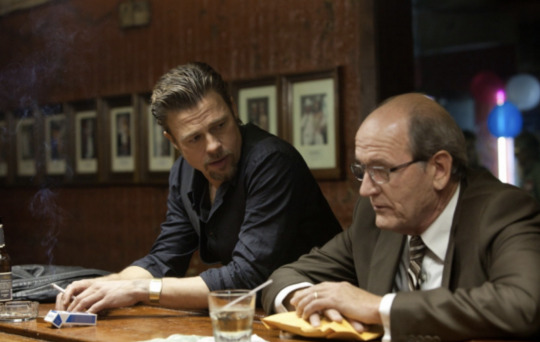
We hear two main voices of authority urging calm throughout Killing Them Softly. Then-President Bush: “I understand your worries and your frustration. … We’re in the midst of a serious financial crisis, and the federal government is responding with decisive action.” Presidential hopeful Obama: “There’s only the road we’re traveling on as Americans.” Paulson speaks on the Emergency Economic Stabilization Act, and various news commentators chime in, too: “There needs to be consequences, and there needs to be major change.” Radio commentary and C-SPAN coverage combine into a sort of secondary accompaniment to Marc Streitenfeld’s score, which incorporates lyrically germane Big Band standards like “Life Is Just a Bowl of Cherries” (“You work, you save, you worry so/But you can’t take your dough”) and “It’s Only a Paper Moon” (“It's a Barnum and Bailey world/Just as phony as it can be”). All of these are Dominik’s additions to Cogan’s Trade, which is a slim, 19-chapter book without any political angle, and this frame is what met so much resistance from contemporaneous reviews.
But what Dominik accomplishes with this approach is twofold. First, a reminder of the ceaseless tension and all-encompassing anxiety of that time, which would spill into the Occupy Wall Street movement, coalesce support around politicians like Bernie Sanders and Elizabeth Warren, and fuel growing national interest in policies like universal health care and universal basic income. For anyone who struggled during that time—as I did, a college graduate entering the 2009 job market after the journalism industry was already beginning its still-continuing freefall—Killing Them Softly captures the free-floating anger so many of us felt at politicians bailing out corporations rather than people. Perhaps in 2012, only weeks after the re-election of Obama and with the potential that his second term could deliver on some of his campaign promises (closing Guantanamo Bay, maybe, or passing significant gun control reform, maybe), this cinematic scolding felt like medicine. But nearly a decade later, with neither of these legislative successes in hand, and with the wins for America’s workers so few and far between—still a $7.25 federal minimum wage, still no federal paid maternity and family leave act, still the refusal by many states to let their government employees unionize—if you don’t feel demoralized by how often the successes of the Democratic Party are stifled by the party’s own moderates or thoroughly curtailed by saboteur Republicans, maybe you’re not paying attention.
More acutely, then, the mutinous spirit of Killing Them Softly accomplishes something similar to what 1990’s Pump Up the Volume did: It allows one to say, with no irony whatsoever, “Do you ever get the feeling everything in America is completely fucked up?” The disparities of the financial system, and the yawning gap between the rich and the poor. The utter lack of accountability toward those who were supposed to protect us, and didn’t. And the sense that we’re always being a little bit cheated by a ruling class who, like Sobotka observed on The Wire, is always putting their hand in our pocket. Consider Killing Them Softly’s quietest moment, in which Frankie realizes that he’s a hunted man, and that the people from whom he stole would never let him live. Dominik frames McNairy tight, his expression a flickering mixture of plaintive yearning and melancholic regret, as he quietly says, “It’s just shit, you know? The world is just shit. We’re all just on our own.” A day or so later, McNairy’s Frankie will be lying on a medical examiner’s table, his head partially collapsed from a bullet to the brain, an identification tag looped around his pinky toe. And the men who ordered his death want to underpay the man who carried it out for them. Isn’t that the shit?
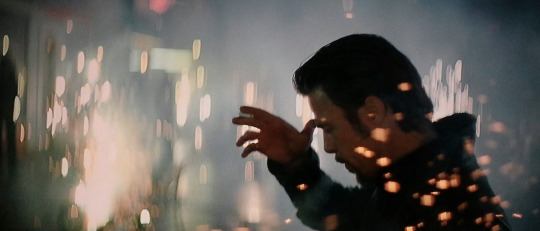
That leads us, then, to the film’s angriest moment, and to a scene that stands alongside the climaxes of so many other post-recession films: Chris Pine’s Toby Howard paying off the predatory bank that swindled his mother with its own stolen money in Hell or High Water, Lakeith Stanfield’s Cash Green and his fellow Equisapiens storming billionaire Steve Lift’s (Armie Hammer’s) mansion in Sorry to Bother You, Viola Davis’s Veronica Rawlings shooting her cheating husband and keeping the heist take for herself and her female comrades in Widows. So far in Killing Them Softly, Pitt has played Jackie with a certain level of remove. A man’s got to have a code, and his is fairly simple: Don’t get involved emotionally with the assignment. Pitt’s Jackie is susceptible to flashes of irritation, though, that manifest as a smile that doesn’t reach his eyes, and as an octave-lower growl that belies his impatience: with the Driver, for not understanding how Markie’s reputation has doomed him; with Mickey, for his procrastination and his slovenliness; with Kenny, for stealing a hardworking woman’s tip; with Frankie, when he tries to distract Jackie from killing Squirrel. Jackie is a professional, and he is intolerant of people failing to work at his level, and Pitt plays the man as tiptoeing along a knife’s edge. Remember Daniel Craig’s “’Cause it’s all so fucking hysterical” line delivery in Road to Perdition? Pitt’s whole performance is that: a hybrid offering of bemusement, smugness, and ferocity that suggests a man who’s seen it all, and hasn’t been impressed by much.
In the final minutes of Killing Them Softly, Obama has won his historic first term in the White House, and Pitt’s Jackie strides through a red haze of celebratory fireworks as he walks to meet the Driver at a bar to retrieve payment. An American flag hangs in this dive, and the TV broadcasts Obama’s victory speech, delivered in Chicago to a crowd of more than 240,000. “Crime stories, to some extent, always felt like the capitalist ideal in motion,” Dominik told the New York Times. “Because it’s the one genre where it’s perfectly acceptable for the characters to be motivated solely by money.” And so it goes that Jackie feels no guilt for the men he’s killed, or the men he’s sent away. Nor does he feel any empathy or kinship with the newly elected Obama, whose messages of unity and community he finds amusingly irrelevant. The life Jackie lives is one defined by how little people value each other, and how quick they are to attack one another if that means more opportunity—and more money—for them. Thomas Hobbes said that a life without social structure and political representation would be “solitary, poor, nasty, brutish, and short,” and perhaps that’s exactly what Jackie’s is. Unlike the character in Cogan’s Trade, Dominik’s Jackie has no wife and no personal life. But he’s surviving this way with his eyes wide open, and he will not be undervalued.
The contrast between Obama’s speech about “the enduring power of our ideas—democracy, liberty, opportunity, and unyielding hope”—and Jackie’s realization that the mob is trying to underpay him for the three men he assassinated at their behest makes for a kind of nauseating, thrilling coda. He’s owed $45,000, and the envelope the Driver paid him only has $30,000 in it. Obama’s audience chanting “Yes, we can,” the English translation of the United Farm Workers of America’s slogan and the activist César Chávez’s iconic “Sí, se puede” catchphrase, adds an ironic edge to the argument between the Driver and Jackie about the value of his labor. Whatever the Driver can use to try and shrug off Jackie’s advocacy for himself, he will. Jackie’s killings were too messy. Jackie is asking for more than the mob’s usual enforcer, Dillon (Sam Shepard), who would have done a better job. Jackie is ignoring that the mob is limited to “Recession prices”—they’re suffering, so that suffering has to trickle down to someone. Jackie made the deal with Mickey for $15,000 per head, and the mob isn’t beholden to pay Jackie what they agreed to pay Mickey.
On and on, excuse after excuse, until one finally pushes Jackie over the edge: “This business is a business of relationships,” the Driver says, which is one step away from the “We’re all family here” line that so many abusive companies use to manipulate their cowed employees. And so when Jackie goes coolly feral in his response, dropping knowledge not only about the artifice of the racist Thomas Jefferson as a Founding Father but underscoring the idea that America has always been, and will always be, a capitalist enterprise first, the moment slaps all the harder for all the ways we know we’ve been let down by feckless bureaucrats like the Driver, who do only as they’re told; by faceless corporate overlords like the mob, issuing orders to Jackie from on high; and by a broader country that seems like it couldn’t care less about us. “I’m living in America, and in America, you’re on your own … Now fucking pay me” serves as a kind of clarion call, an expression of vehemence and resentment, and a direct line into the kind of anger that still festers among those continuously left behind—still living in Shitstown, still trying to make a better life for themselves, and still asking for a little more respect from their fellow Americans. For all of Killing Them Softly’s ugliness, for all its nihilism, and for all its commentary on how our country’s ruthless individualism has turned chasing the American dream into a crippling addiction we all share, that demand for dignity remains distressingly relevant. Maybe it’s time to listen.
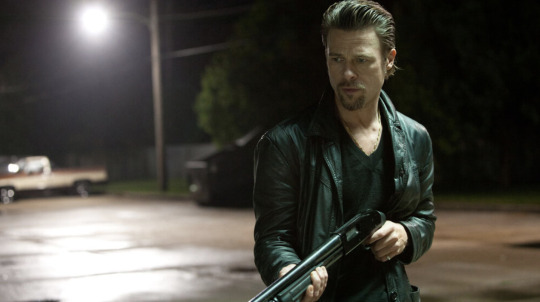
#killing them softly#andrew dominik#andrew dominik film#brad pitt#Jackie Cogan#james gandolfini#richard jenkins#ray liotta#scoot mcnairy#ben mendelsohn#american cinematographer#financial crisis 2008#independent film#beastie boys#oscilloscope laboratories#film writing#musings
33 notes
·
View notes
Text
The Problems with Aladdin: Orientalism, Casting, and Ramadan

Originally posted on Medium.
Edward Said and Jack G. Shaheen did not do the work they did so that movies like Aladdin would still get made.
I say this as someone who has had a complicated relationship with the 1992 Aladdin animated feature. I loved it when I was a kid. For a long time, it was my favorite Disney cartoon. I remember proudly telling white friends and classmates in third grade that Aladdin was “about my people.” Although nothing is said in the movie about Aladdin’s religion, I read him as Muslim.
When I grew older, I read Jack G. Shaheen’s book, Reel Bad Arabs, which analyzes about 1,000 American films that vilify and stereotype Arabs and Muslims. Among these films is Aladdin, which Shaheen reportedly walked out of. Shaheen spoke out against lyrics in the film’s opening song: “I come from a land from a far-away place/Where they cut off your ear if they don’t like your face/It’s barbaric, but hey, it’s home.” Although he convinced Disney to remove the lyrics for the home video release, the final verse was still there: “It’s barbaric, but hey, it’s home.” As a 1993 op-ed in The New York Timeswrote, “It’s Racist, But Hey, It’s Disney.”
In Edward Said’s seminal book, Orientalism (1978), he described orientalism as a process in which the West constructs Eastern societies as exotic, backwards, and inferior. According to Said, orientalism’s otherization of Arabs, Muslims, and Islam provided justification for European colonialism and Western intervention in the Middle East and Muslim-majority countries, often under the pretext of rescuing the people — especially Muslim women — from themselves. In addition to orientalism’s practices of constructing the “Orient” as the West’s “Other,” Said asserted that another major facet of orientalism involves a “western style for dominating, restructuring, and having authority over the ‘Orient.’” In other words, it is not the Arab or Muslim who gets to define themselves, but rather the West does.
There are plenty of excellent and detailed critiques out there about how the original Aladdin is filled with racist, sexist, and orientalist tropes, so there’s very little, if anything, to say that already hasn’t been said. In her extensive report, “Haqq and Hollywood: Illuminating 100 Years of Muslim Tropes And How to Transform Them,” Dr. Maytha Alhassen argues that Hollywood’s legacy of depicting Arabs and Muslims as offensive caricatures is continued in Aladdin, where the main characters like Aladdin and Jasmine are “whitewashed, with anglicized versions of Arabic names and Western European (though brown-skinned) facial features” and speak with white American accents. Alhassen notes the contrast with the “villains, Jafar, and the palace guards” who are depicted as “darker, swarthy, with undereye circles, hooked noses, black beards, and pronounced Arabic and British accents.” In another article, “The Problem with ‘Aladdin,’” Aditi Natasha Kini asserts that Aladdin is “a misogynist, xenophobic white fantasy,” in which Jasmine is sexualized and subjected to tropes of “white feminism as written by white dudes.” Not only does Jasmine have limited agency in the film, Kini writes, but her role in the film is “entirely dependent on the men around her.”
When Disney announced plans to produce a live-action remake of Aladdin, I learned through conversations that the Aladdin story is not even in the original text for Alf Layla wa Layla, or One Thousand and One Nights. It was later added by an 18th century French translator, Antoine Galland, who heard the story from a Syrian Maronite storyteller, Hanna Diyab. Galland did not even give credit to Diyab in his translation. Beyond the counter-argument that “the original Aladdin took place in China,” I am left wondering, how much of the original tale do we really know? How much did Galland change? It’s possible that Galland changed the story so significantly that everything we know about Aladdin is mostly a western, orientalist fabrication. For a more detailed account about the origins of the Aladdin tale, I recommend reading Arafat A. Razzaque’s article, “Who ‘wrote’ Aladdin? The Forgotten Syrian Storyteller.”
Disney has been boasting about how the live-action Aladdin is one of the “most diverse” movies in Hollywood, but this is an attempt to hide the fact that the casting of this film relied on racist logic: “All brown people are the same.” It’s great that an Egyptian-Canadian actor, Mena Massoud, was cast in the lead role, but there’s inconsistency elsewhere: Jasmine is played by British actress Naomi Scott, who is half Indian and half white; Jafar is played by Dutch-Tunisian actor Marwan Kenzari; and Jasmine’s father and a new character, Dalia, are played by Iranian-American actors Navid Negahban and Nasim Pedrad, respectively. The casting demonstrates that the filmmakers don’t know the differences between Arabs, Iranians, and South Asians. We are all conflated as “one and the same,” as usual.
Then there’s the casting of Will Smith as the genie. Whether deliberate or not, reinforced here is the Magical Negro trope. According to blogger Modern Hermeneut, this term was popularized by Spike Lee in 2011 and refers to “a spiritually attuned black character who is eager to help fulfill the destiny of a white protagonist.” Moreover, the author writes that Lee saw the Magical Negro as “a cleaned up version of the ‘happy slave’ stereotype, with black actors cast as simpleminded angels and saints.” Examples of the Magical Negro can be found in films like What Dreams May Come, City of Angels, Kazaam (which also features a Black genie), The Green Mile, The Adjustment Bureau, and The Legend of Bagger Vance. In the case of Aladdin, the genie’s purpose is to serve the protagonist’s dreams and ambitions. While Aladdin is Arab, not white, the racial dynamic is still problematic as the Magical Negro trope can be perpetuated by non-Black people of color as well.
I need to pause for a moment to explain that I don’t believe an Aladdin movie should only consist of Arab actors. Yes, Agrabah is a fictional Arab country, but it would be perfectly fine to have non-Arabs like Iranians, South Asians, and Africans in the movie as well. That’s not the issue I have with the casting, and this is not about identity politics. My problem is that the filmmakers saw Middle Eastern and South Asian people as interchangeable rather than setting out to explore complex racial, ethnic, and power dynamics that would arise from having ethnically diverse characters existing within an Arab-majority society. Evelyn Alsultany, an Associate Professor who was consulted for the film, states in her post that one of the ways Disney tried to justify casting a non-Arab actress for Jasmine was by mentioning that her mother was born “in another land.” However, this seems to have been Disney doing damage control after they received some backlash about Jasmine’s casting. The result is convenient erasure of an Arab woman character. Moreover, the change in Jasmine’s ethnicity does little, if anything, to reduce the film’s problematic amalgamation of Middle Eastern and South Asian cultures. Alsultany writes that “audiences today will be as hard pressed as those in 1992 — or 1922, for that matter — to identify any distinct Middle Eastern cultures beyond that of an overgeneralized ‘East,’” where “belly dancing and Bollywood dancing, turbans and keffiyehs, Iranian and Arab accents all appear in the film interchangeably.”
Other examples of how the film conflates various Middle Eastern and South Asian cultures is highlighted in Roxana Hadadi’s review: “Terms like ‘Sultan’ and ‘Vizier’ can be traced to the Ottoman Empire, but the movie also uses the term ‘Shah,’ which is Iranian monarchy.” Referring to the dance scenes and clothing, she writes they are “mostly influenced by Indian designs and Bollywood styles” while “the military armor looks like leftovers from Ridley Scott’s Kingdom of Heaven.” An intersectional approach to the diverse ethnic communities represented in the film would have made for a more nuanced narrative, but this would have required a better director.
Speaking of the director, it is amazing that, of all people, Disney hired Guy Ritchie. Because if there is any director out there who understands the importance of representation and knows how to author a nuanced narrative about Middle Eastern characters living in a fictitious Arab country, it’s… Guy Ritchie? Despite all of the issues regarding the origin of the Aladdin story, I still believed the narrative could have been reclaimed in a really empowering way, but that could not happen with someone like Guy Ritchie. It’s textbook orientalism to have a white man control the narrative. I would have preferred socially and politically conscious Middle Eastern and Muslim writers/directors to make this narrative their own. Instead, we are left with an orientalist fantasy that looks like an exoticized fusion of how a white man perceives South Asia and the Middle East.
Lastly, I have to comment on how this movie was released during the Islamic holy month of Ramadan. In fact, the film’s release date, May 24th, was just one day before the last ten days of Ramadan, which are considered to be the most important in the month. During Ramadan, Muslims around the world fast — if they are able to — from dawn to sunset every day for 30 days. The time when we break our fast, iftar, typically involves dinner and prayer with family, friends, and/or the community. But Ramadan is more than just about fasting, it’s a time of self-reflection, compassion, and strengthening our connection with Allah, our loved ones, and community. I don’t believe Disney released Aladdin during Ramadan intentionally. If anything, I think the film’s release date is reflective of how clueless and ignorant Disney is. It’s so ridiculous that it’s laughable.
I don’t want to give the impression that Muslims don’t go out to the movies during Ramadan. Of course there are Muslims who do. I just know a lot who don’t— some for religious reasons and some, like myself, for no other reason than simply not having enough time between iftar and the pre-dawn meal, sehri (I mean, I could go during the day, but who wants to watch a movie hungry, right?). Even Islamophobic Bollywood knows to release blockbuster movies on Eid, not towards the end of Ramadan.
But this isn’t about judging Muslim religiosity during the holy month. No one is “less” of a Muslim if they are going to the movie theater or anywhere else on Ramadan. My point is that Disney has not shown any consideration for the Muslim community with this movie. They did not even consider how releasing the film during Ramadan would isolate some of the Muslim audience. It’s clear that Disney did not make efforts to engage the Muslim community. Of course, there is nothing surprising about this. But you cannot brag about diversity when you’re not even engaging a group of people that represents the majority of the population you claim to be celebrating! In response to Shaheen’s critiques of the original Aladdin cartoon, a Disney distribution president at the time said Aladdin is “not just for Arabs, but for everybody.” But this is a typical dismissive tactic used to gloss over the real issues. No doubt Disney will follow the same script when people criticize the latest film.
I don’t have any interest in this movie because it failed to learn anything from the criticism it received back in 1992. The fact that a 1993 op-ed piece titled, “It’s Racist, But Hey, It’s Disney” is still relevant to the live-action version of a film that came out 27 years ago is both upsetting and sad at the same time. As I said earlier, Edward Said and Jack Shaheen did not exhaustively speak out against orientalism, exoticism, and vilification to only see them reproduced over and over again. Of course Disney refused to educate themselves and listen to people like Shaheen— their Aladdin story was never meant for us.
20 notes
·
View notes